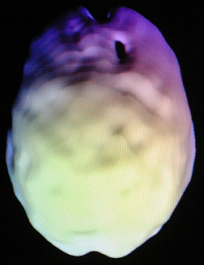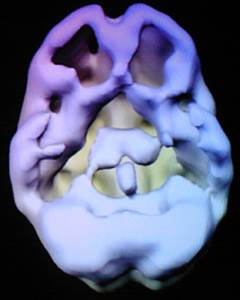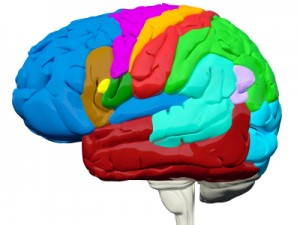
Brain Scans…
Posted: June 17, 2019 3:10 pm
Alecia, 22, was a very bright young college student, but she was no longer performing up to her potential. She was having trouble thinking clearly, problems with goal setting, and difficulty staying organized. She also felt like she didn’t have enough energy, was prone to angry outbursts, and spent money foolishly. It got so bad she had to drop out of school.
What was Alecia’s problem?
To find out, Alecia’s parents took their daughter for a brain scan, which revealed marked decreased activity in her prefrontal cortex and temporal lobes. The problems, it turned out, stemmed from an accident she’d had a year earlier when she tripped and fell face first on a slick, rain-soaked ramp at college. The fall had caused a traumatic brain injury even though she never passed out. Based on the brain scan, Alecia was given a treatment plan targeted to help heal and balance her brain and eventually returned to school where she excelled.



But what would have happened if she hadn’t gotten that brain scan?
The #1 Key to Optimal Performance—Your Brain
If you want to perform at your peak level at work, in school, or on the playing field, you need a healthy brain. Your brain is involved in everything you do and everything you are, including how you think, feel, act, and interact with others. Your brain is the organ of learning, communicating, personality, character, and every decision you make.
When your brain works right, you work right—whether we’re talking about work, school, sports, relationships, money, health, or anything else. Likewise, when your brain is troubled for whatever reason, you are much more likely to have trouble in your life.
How Can You Know Unless You Look?
The problem is no one ever looks at your brain. If you go to the doctor with crushing chest pain, they’ll scan your heart. But if you have crushing sadness, no one will scan your brain.
This needs to change. Brain imaging technology called SPECT measures blood flow and activity in the brain and can reveal areas of the brain with healthy activity, too much activity, or not enough activity. With this knowledge, you can get personalized strategies to balance brain activity for next-level performance.
Here’s what SPECT brain scans show about some of the most common issues that could be impacting your performance.
ACTING IMPULSIVELY
Routinely acting impulsively without considering the consequences or taking uncalculated risks can get you into hot water and cause losses for you and your organization.
SPECT findings: Impulsivity is often associated with low activity in the brain’s frontal lobes. In some people, it is associated with ADD/ADHD.
GETTING STUCK IN YOUR WAYS
Falling into a rut can prevent you from staying up to date in terms of skills and trends. When you’re stuck in outdated thinking patterns, it stunts creativity and innovation.
SPECT findings: Too much activity in the brain’s frontal lobes is commonly seen in people who tend to get stuck, have looping thoughts, or compulsive behaviors. In severe cases, it is linked to obsessive compulsive disorder.
ANGER/MOOD ISSUES
How can you expect to perform your best when you feel mad, sad, or anxious? These issues can rob your motivation, drain your energy, and sideline your ability to focus on your goals.
SPECT findings: Anger and aggression are often linked to damage in the temporal lobes. People who have low moods or depression often have increased activity in the brain’s limbic system, and those with high anxiety tend to have too much activity in the basal ganglia, insular cortex, and amygdala.
RELATIONSHIP PROBLEMS
There’s no way to be operating at full capacity if you’re constantly butting heads with your colleagues, classmates, or teammates. And relationship problems at home can spill over into the mindset you take to the office, classroom, or playing field and throw you off your game.
SPECT findings: Having trouble getting along with others can be associated with a variety of brain issues. Low activity in the frontal lobes can make you blurt out hurtful things. Too much activity in this area can make you argumentative and prone to pointing out what you don’t like about others. Abnormal activity in the temporal lobes can make you tend to have temper problems. All of these things can make it hard for you to maintain personal and professional relationships.
DISORGANIZATION
How can you hit your deadlines and do your best work when you can’t find your files, lose your phone with all your contacts, and miss important meetings because you put a reminder on a sticky note that’s now under a pile of stuff?
SPECT findings: Decreased activity in the frontal lobes is commonly seen in people who are disorganized and those who have ADD/ADHD.
MEMORY ISSUES
You can’t be your best if you can’t remember due dates, upcoming appointments, people’s names, or your team’s playbook.
SPECT findings: A number of brain issues can be associated with memory problems, including overall low blood flow, a toxic-looking brain, or damage from a traumatic brain injury.
Seeing is believing. When you see on SPECT scans that your brain is troubled, it gives you a blueprint to finding the right strategies to balance it. And when you optimize your brain function, you optimize your ability to perform at your very best. Get your brain right and it will be much easier for you to be at the top of your game in every area of your life.
At Amen Clinics, we utilize brain SPECT imaging to help people see what’s happening in their brain that is keeping them from performing at peak levels. We have helped thousands of CEOs, executives, entertainers, influencers, professional and college athletes, and students optimize their brain health and enhance their performance in everything they do.
If your performance at work, in school, or on the field is holding you back, finding the root cause is the first step to turning things around. Call 855-978-0161 today to speak to a specialist about getting a brain scan as part of a complete evaluation or schedule a visit online.
